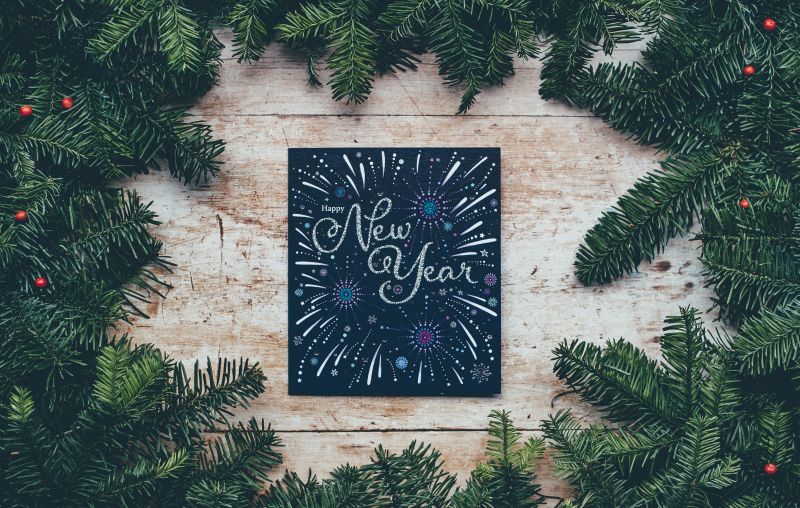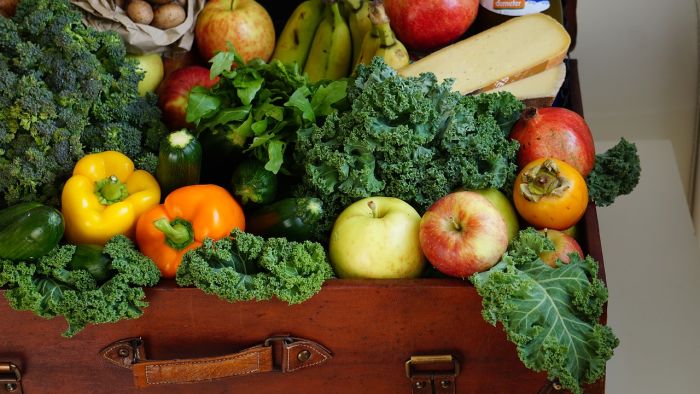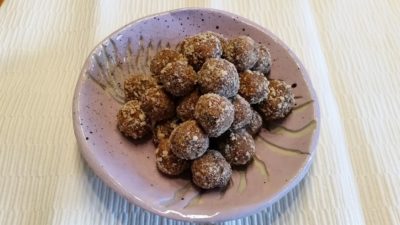“The gift of self-discipline is that it has the power to take you beyond the reasoning of temporary emotion to freedom. Think of how empowered you’ve felt on occasion when you haven’t given into the ‘I don’t feel like it’ syndrome and honored your commitment to yourself. What does not ‘feeling like it’ have to do with it? The combination of love for something with the willingness to do what it takes to practice it – discipline – results in freedom.” Michael Beckwith, author of Spiritual Liberation.
Even if you don’t believe in setting New Year’s Resolutions, New Years is a fantastic time for renewal, re-commitment and discipline with our habits for wellbeing. Most of us are tired from the excess during the holidays and are ready to commit to eating healthier, exercising more and generally taking better care of ourselves. Visions of sugar plums turn to visions of wellness as we return to the gym, the yoga mat and the vegetable aisle at the grocery store.
I recently came across an old journal and found my New Year’s resolutions from 15 years ago. Like a bull at a gate, I committed to; running five days a week, one hour of yoga five days a week, plus one hour of daily meditation, no caffeine, no alcohol, no sugar, no starches, no fun. Well, perhaps not that strict, but pretty darn close. Needless to say, my resolutions made it as far as mid-January. I’ve heard this same story from many people. You kick off the New Year in high gear, hitting the gym intensely and regularly, doing yoga consistently, eating healthier, then come April, all goes to hell in an Easter basket.

I learned over time that our lives are essentially the sum of our habits. As Aristotle said, “We are what we repeatedly do, excellence, then is not an act but a habit.” These days, I like to focus on the small things that I can do consistently to create positive change overtime. One little, doable step at a time. Here are four tips to help you incorporate more good health and happiness in 2017:
1. Mindfulness
This is the number one habit I recommend adding to your daily routine. I look at mindfulness meditation as a foundation for all the other habits we can create for health and well-being. Because when we quiet our thinking minds, we’re able to better listen to the needs of the body, and create healthy habits that are realistic for our body, our time, and our lives. Not only will mindfulness help improve your ability to listen to the body, it will help you feel a sense of calm during the highs and lows of life, help improve your connections with loved ones (and not so loved ones) and truly understand that everything changes…the good, the bad, the ugly.
How: I recommend starting with a 5 minute meditation practice. Set a timer (there are some great free apps available. One of my favorites is insight timer. Sit with an erect spine; alert, yet at ease in the body. Bring your full attention to the natural rhythm of your breath. It’s very likely your mind will wander. When this happens, gently, without judging your practice, return your attention to the sensation of breathing. Lather, rinse repeat until the 5 minutes is up.
Developing a meditation practice isn’t easy, so I highly recommend practicing with a group or a trained teacher. The great thing about the practice of mindfulness meditation today is that it is a secular practice, no chanting, or living in a yurt required. A regular practice of mindfulness will help you listen to your body, develop compassion for yourself as well as for others and give you an ability to let the small stuff go.
2. Consistency over intensity
Examine your current daily routine and see where you can add a small, achievable habit that you can do consistently. Forget the concept of crushing it one hour at the gym everyday, if that isn’t realistic.
How: If it’s more physical activity you need, choose something you enjoy and make your goals doable (i.e. a ten minute walk or run) and then, show up. Make a commitment to do that day in and day out until it becomes a habit. If you start small, chances are a 10 minute walk will, on some days, turn into a 30 or 40 minute walk or run. Add a few friends to the mix, and you’ll be even more motivated to stick to it. Some days, you may just do 10 minutes, but make it a ritual and develop your discipline muscle. And when you wake up with that “don’t feel like doing it” feeling, just bring awareness to that feeling. Don’t label, judge, or get attached to the feeling. Just notice. Then…lace up your shoes and walk out the door. Like Michael Beckwith said, “What does not feeling like it have to do with it?” Another favorite quote of mine on discipline comes from Jon Kabat-Zinn, director of the Stress Reduction Clinic and the Center for Mindfulness in Medicine at the University of Massachusetts Medical School. He said, “Discipline provides a consistency which is independent of what kind of day you had yesterday and what kind of day you anticipate today.”
3. Crowding out theory
One little, maybe not so interesting, tidbit about my past is that I worked in an Economic Consulting firm in California. I did some research work and was in charge of the library (flipping through fascinating journals such as “Applied Economics” and “The Economic Journal”). I wasn’t passionate about economics at all, but I did remember a few things. One was the economic theory of “crowding out.” It is a phenomenon occurring “when expansionary fiscal policy causes interest rates to rise, thereby reducing investment spending. That means increase in government spending ‘crowds out’ investment spending.” Exciting stuff…are you still with me? Truth is, I didn’t remember this quote exactly…I googled it.
The Institute for Integrative Nutrition wisely applied this “crowding out” theory to our eating habits. Often, around this time of year, we think about all the things we need to remove from our diets; cookies, chocolate, caffeine, bread, alcohol, pastas, dairy, etc. Just the thought of it can be overwhelming, cause a feeling of deprivation and can lead us to the nearest patisserie.
How: Instead of focusing too much on the giant list of what we need to remove, let’s focus on bringing in (or crowding out your body) with more healthy whole fruits, vegetables, healthy oils/fats, water and whole grains. When you add more of these items to your diet, your body will feel more nourished, more energized and balanced. If you are energizing your body with nutrient-dense foods, you are less likely to crave sugary, starchy, processed foods and caffeine.
A little aside (and some shameless marketing), in my Course In Mindfulness, I devote one week to mindful eating. We start by examining our habits with eating; just taking a moment to notice when we are eating out of hunger, perhaps boredom or craving. We follow it up with a mindfulness meditation practice to reconnect in a healthy way, the simple practice of eating. We focus on sensations in the body in order to recognize if there is hunger or craving in the body. We then do a mindful eating practice to remember to tap into all the sensory perceptions (smell, visual, taste, auditory, sensation) while eating. When we eat in this way, eating becomes more pleasurable, satisfying and we are more likely to choose foods that will nourish rather than contaminate our bodies.

4. Compassion
An important element in our health and happiness includes compassion towards ourselves and others. Also in my course, (and you can also find a guided meditation online) we practice “metta” or “compassion” meditation. It’s so easy to be hard on ourselves when it comes to taking care of ourselves; perhaps judging ourselves harshly when the scale moves up or down or things don’t turn out the way we expected. Compassion practice doesn’t let us off of the hook and say, “oh go ahead and stay in your pajamas and enjoy those leftover holiday cookies.” Compassion gives us the ability to let go of the self flagellation when we slip up, take action when we need to and let go of the unproductive negative loop in our heads.
Buddhist monk, Matthieu Ricard, deemed “The Happiest Man Alive” was determined to be neurologically « happier » than non meditators after a 12-year medical study at the University of Wisconsin. The type of meditation he practices? Metta or Compassion meditation. So, even the science shows that regular practice of Metta meditation makes us happier, gives us a sense of connection and helps us develop understanding and empathy toward ourselves and others.
How: Here is a very simplified version of the practice: Taking a comfortable seat (set your timer for 5 minutes), start by bringing your attention to your breath. Think of someone who loves or loved you unconditionally (a family member, grandparent or friend); cultivating the feeling of being cared and loved for by another. We start the practice with ourselves, because we can’t give away what we don’t already have. Silently repeat to yourself; “May I be happy. May I be healthy. May I be at peace.” Repeating it silently to yourself with a feeling of unconditional love in your heart. Then extend your meditation towards someone you can easily offer these three phrases to. Finally, we extend this meditation out to include all beings, near and far.
So, take a moment to be mindful of your habits. Find the small ways you can add healthy habits to your life, make them doable and go for consistency over intensity, crowd out the unwholesome foods with more healthy whole foods, add a compassion practice and you’ll be well on your way to making 2017 a consistently happy and healthy new year.
Credits:
- Spiritual Liberation, Michael Beckwith
- Long-term meditators self-induce high-amplitude gamma synchrony during mental practice, Proceedings of the National Academy of Sciences
About the author:
Jennifer Frye has been teaching Mindfulness Meditation and Yoga in Neuchâtel since 2007. She has completed courses in vipassana (insight) meditation, yoga teacher trainings, mindfulness based stress reduction (MBSR), and professional courses in positive neuroplasticity training.
She teaches a 6 week secular Mindfulness Meditation course based on her studies with a variety of teachers including Rick Hanson, Jon Kabat-Zinn, Sharon Salzburg, S.N. Goenka. She also teaches workshops and weekend Yoga and Mindfulness Meditation retreats.
Find out more about Jennifer: www.wellbalanced.me
Tags: balance méditation mindfulness








